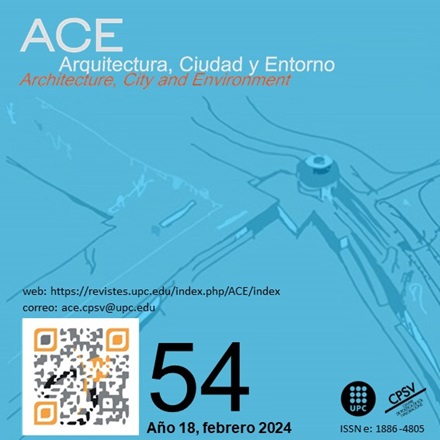Cartografies de la urbanització concentrada. Anàlisi d’iniciatives globals, regionals i nacionals a Amèrica Llatina
DOI:
https://doi.org/10.5821/ace.18.54.12031Paraules clau:
ciutats ordinàries, governança urbana, Cartagena d’Índies, urbanització planetàriaResum
Des de començament del segle XXI, governs, organitzacions internacionals i acadèmia van generar iniciatives per gestionar i governar les ciutats, en resposta a acords globals i partint de la narrativa de “l’era urbana” punt d’inflexió en què la humanitat és predominantment urbana. Moltes insisteixen a definir com a “urbans” països i regions en funció de llindars de concentració de persones i per tipus d’assentaments. Considerem aquestes aproximacions reductives, ja que juntament amb altres autors entenem allò urbà i la urbanització no com a objectes empírics sinó categories teòriques per comprendre processos històrics de concentració i extensió amb dimensions sòcio-espacials, variables i dinàmiques. Aquest article critica el model de transició lineal que segueixen aquestes iniciatives i qüestionem la seva capacitat per mesurar, mapejar i governar les transformacions generades per la urbanització. Per això recollim indicadors qualitatius i quantitatius multisectorials de 9 iniciatives sobre l’exercici i la caracterització espacial de diverses ciutats i desenvolupem una Matriu d’indicadors inèdita. Presentem el cas paradigmàtic de Cartagena de Índies, Colòmbia, on comparem el mesurament i les cartografies de la urbanització concentrada. Les nostres troballes se circumscriuen a aquesta ciutat, però l'anàlisi d'altres urbs llatinoamericanes va evidenciar problemes recurrents: variabilitat d'escales; comparabilitat de mètriques i cartografies; desconnexió entre evidències, models d’interpretació i prescripcions; biaix empíric en caracteritzar la urbanització; i dificultats per a la governança. Argumentem, amb evidències del sud global, que en imposar narratives i mètodes del nord global sense reflexió crítica aquestes iniciatives no tenen marcs adequats per intervenir les constants agitacions i entrellaçaments produïdes per la urbanització contemporània.
Descàrregues
Publicades
Número
Secció
Llicència
| CRITERIS DE PROTECCIÓ INTEL·LECTUAL |
En aquest moment es compta amb la protecció de la Oficina Espanyola de Patents i Marques, mentre que la protecció global s'està tramitant davant la Organització Mundial de la Propietat Intel·lectual (OMPI/WIPO). Així mateix, la Oficina del Número de Sèrie Estàndar Internacional (ISSN) ha otorgat els següents números: 1886-4805 (versió electrònica) i 1887-7052 (versió en paper). |
| COPYRIGHT |
El contingut dels articles i els comentaris en ells expresats són responsabilitat exclusiva dels seus actors, i no reflexen necessariament la opinió del Comité Editor de la revista. Els treballs publicats per ACE queden sotmesos a la llicència CC BY-NC-ND 3.0 ES http://creativecommons.org/licenses/by-nc-nd/3.0/es/ La qual cosa vol dir que les persones autores només tenen i retenen els drets d'autor dintre de les limitacions imposades per la anterior llicència |





































